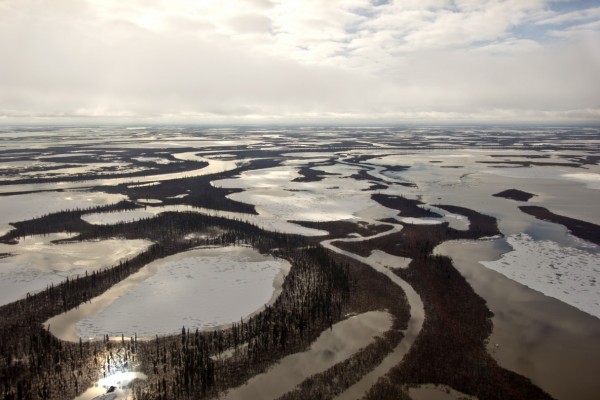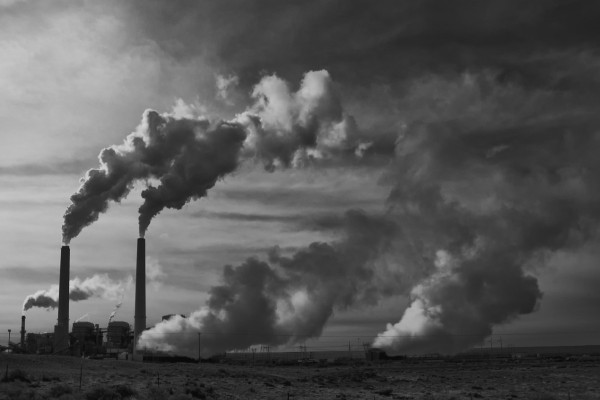A Canadian Green New Deal is Alberta’s best hope for the future
Albertans need a political vision to challenge the oil industry and the executives reaping the benefits of Kenney’s tax cuts

A Green New Deal sign is held up in front of the sculpture “The Crier” by artist Gerhard Marcks near the Brandenburg Gate in Berlin on Sept. 20. Photo by John MacDougall/AFP.
Canadians might not like to admit it, but what happens in the United States can have a significant impact on our lives north of the border. We’re constantly tuned into American culture, news, and politics, yet our governments—both federal and provincial—don’t seem to be doing enough to plan for potential US policy shifts, especially at a time when big changes are more likely than ever before.
Last year, we were treated to the spectacle of the federal government seeming to be caught off-guard when President Donald Trump announced that states would be allowed to import lower priced drugs from Canada. The policy had been floating around Capitol Hill for years, but even after all that time, it seemed as though no one on either side of the border had bothered to consider what it would mean for Canadians. That fuelled a news cycle of warnings about potential drug shortages if, all of a sudden, Canada had to start supplying a country with ten times its population. The Trump administration put forward its new rules in December for how the importation would work, even as pharmaceutical groups on both sides of the border question whether it would actually reduce prices. But all the Canadian government seems to be able to do is promise to protect the drug supply, with few indications of how they would actually go about doing it.
When the new rules take effect, Canadians across the country could be impacted, at least in the short-term, but that’s not the only potential shift our governments should be planning for.
The Green New Deal is gaining popularity south of the border and Bernie Sanders, its main champion among the Democratic presidential candidates, is leading in recent polls. Its implementation could close off the market for 96 percent of Canada’s oil exports, yet the governments of Alberta and Canada are likely doing little to plan for such an eventuality. Any pessimism about the future of the oil sands is unwelcome when the people in power have been captured by the oil industry.
Governments stuck in the past
It won’t come as a surprise to any Canadian to hear that Albertans are struggling. The economy isn’t doing well, insolvencies were up 15 percent in 2019 over the year previous, and the suicide rate has been steadily increasing as unemployment has gotten worse. There’s no denying there’s a social crisis in Alberta to accompany its weak economy, but the federal and provincial governments have chosen to emphasize the oil sector as the province’s way out of its difficult situation despite the boom-bust cycle that accompanies near-absolute dependence on fossil fuel extractivism. And that’s not to mention the climate implications, which is what could ultimately send their whole plan off the rails.
Around the world, the effects of climate change are increasingly clear. 2019 was the second-warmest year on record, with average temperatures of 0.98ºC above aver-age, and a recent government report found that Canada is warming at twice the global average—even more in the North.
Changes to the climate are altering weather systems and intensifying flooding, drought, and wildfires, most visible in the bushfires that have been ravaging Australia these past few months, killing over a billion animals and burning more than 100,000 square kilometres. But it’s also being felt much closer to home, including in the heart of the oil patch, where Fort McMurray was devastated by fires in 2016.
Despite branding himself a ‘green’ prime minister, Justin Trudeau’s climate policies have not lived up to his early commitments. He went to the Paris conference promising to keep global warming below 1.5ºC, but then held on to the weak emissions reduction targets of the previous Conservative government, which his government isn’t on track to meet, and sold a carbon tax as the solution, even though the evidence shows it won’t be nearly enough. Meanwhile, his government nationalized the Trans Mountain pipeline project from Alberta to the coast of British Columbia to ensure it gets built, hiding its true cost from Canadians and ignoring concerns about whether there’s truly an Asian market at the end of it, or just another path for Alberta bitumen to get to US refineries.
The newly elected United Conservative government in Alberta isn’t any better. Premier Jason Kenney’s corporate tax cuts have boosted the profits of multinational oil companies, but they didn’t respond by hiring more workers—in some cases, they even laid them off. His ‘war room’ aimed at countering inconvenient truths about the oil sands’ dirty energy and dismal future has also been a complete failure. He even used the occasion of the downing of Ukrainian International Airlines Flight 752 near Tehran, in which 57 Canadians and another 81 people en route to Canada were killed, to tout Alberta’s oil sector.
It is clear that Kenney will do almost anything to position oil and gas as key to Alberta’s future, despite the global headwinds blowing in the opposite direction. But his plan has also included massive cuts to the public service, universities, schools, healthcare, publicly funded research, the arts, the film industry, and more — all of which will decrease the province’s economic diversity, its resilience to future resource busts, and its competitiveness in the sectors that will be key to a post-oil economy. In effect, Kenney’s agenda is aimed at giving the province few options but to double down on its unstable and unreliable oil resources, which leaves it vulnerable to the global momentum away from fossil fuels, and especially to the growing movement for a Green New Deal in the United States.
Alberta premier Jason Kenney. Photo by Jason Griffin/Flickr.
US Green New Deal would end oil imports
The Green New Deal exploded at the end of 2018, when newly elected Congress-woman Alexandria Ocasio-Cortez spoke to members of the Sunrise Movement, a youth environmental group, after they’d occupied Nancy Pelosi’s office on Capitol Hill. She followed it up by introducing a Green New Deal resolution in February 2019 alongside Senator Ed Markey to give a rough outline of what the policy would entail.
As a result of the popularity of the Green New Deal and the renewed urgency for cli-mate action as 57 percent of Americans report being “alarmed” or “concerned” about global warming, an ambitious climate policy has become a prerequisite for any candidate seeking the Democratic nomination for president. Nearly all the candidates have co-sponsored or said they support Ocasio-Cortez and Markey’s resolution, but Bernie Sanders has presented the most radical plan. Given his record-setting fundraising with more then five million contributions and surge in the polls, Sanders’ climate plan could ultimately be the one that gets implemented—and it would significantly change the United States.
Sanders’ Green New Deal would entail a rapid transition to 100 percent renewable energy, the retrofit of buildings across the country to make them more energy efficient and resilient to extreme weather, significant investments in public transportation and high-speed rail, targeted spending in communities across the country that have been left behind for decades, and a just transition for communities and workers that would include a job guarantee, the maintenance of salary and benefits, opportunities for job training, and even support for early retirement if that’s the best option for those workers.
Those initiatives would not only address the US contribution to the climate crisis, but it would improve the lives of millions of people across the country—and make no mistake, its effects would be felt beyond the United States, including in its northern neighbour. Sanders’ plan not only calls for a ban on the export of oil produced in the United States, but it would also ban oil imports, including all the oil that Alberta sends to refineries down south. If you think the suffering in Alberta is bad now, imagine what would happen if the market for almost all of its oil suddenly stops buying. But Kenney and Trudeau refuse to consider such an outcome, and their neglect will cost not just Albertans, but all Canadians dearly if we don’t change course.
Canada and Alberta need swift climate action
It is completely understandable that Albertans, faced with a weakened economy, want the sector they’ve relied on for their prosperity in recent decades to rebound and keep delivering, but they would be far better off recognizing that the world is moving on from fossil fuels and if they double down on a resource of the past, they’ll get left behind and find themselves in the lurch once again, five or ten years down the road. However, it isn’t up to everyday Albertans trying to find a job and pay the bills to know what that future should look like. That requires leadership and vision, precisely what the provincial and federal political classes are lacking.
Canadians are already signalling they’re open to change. In a poll conducted last April, 66 percent of Canadians backed a Green New Deal with higher taxes on the wealthy and large corporations, including 60 percent of Albertans. Another poll conducted in November showed the best policy to achieve that transition, while bridging the geographic divides that have dominated the post-election discourse, is to “under-take a large-scale jobs program that invests in clean energy and green infrastructure.” That approach has the support of 78 percent of people across the country, including 64 percent of people in Alberta—but that’s exactly what Trudeau shied away from in the election, instead preferring market-based measures like a carbon tax.
Our governments have a history of failing to plan for major US policy shifts, but the possibility of a Green New Deal south of the border should be a signal that Canada must become more ambitious, not wait for our industries to be decimated before we consider taking another approach. Canada needs its own Green New Deal to enable a rapid transition away from fossil fuels that benefits every working class Canadian by guaranteeing them good jobs, improving their public services, and investing in their communities instead of letting ‘the market’ decide who prospers and who falls into poverty. But that will require political vision ready to challenge the oil industry and the executives reaping the benefits of Kenney’s tax cuts and Trudeau’s public subsidies.
Paris Marx is a writer and graduate student at McGill University. They are the editor of Radical Urbanist and have previously written for NBC News, Toronto Star, and Jacobin.










